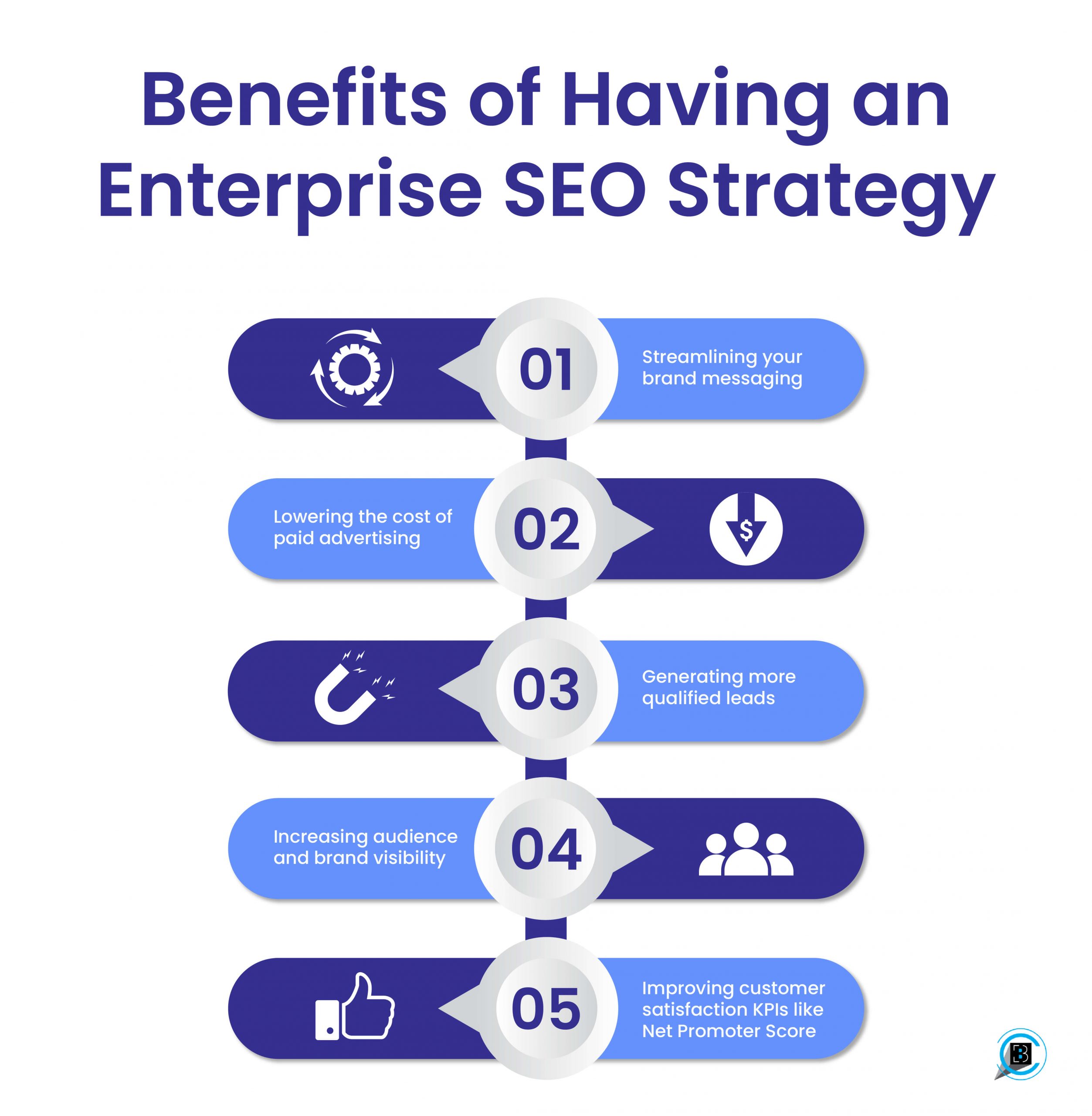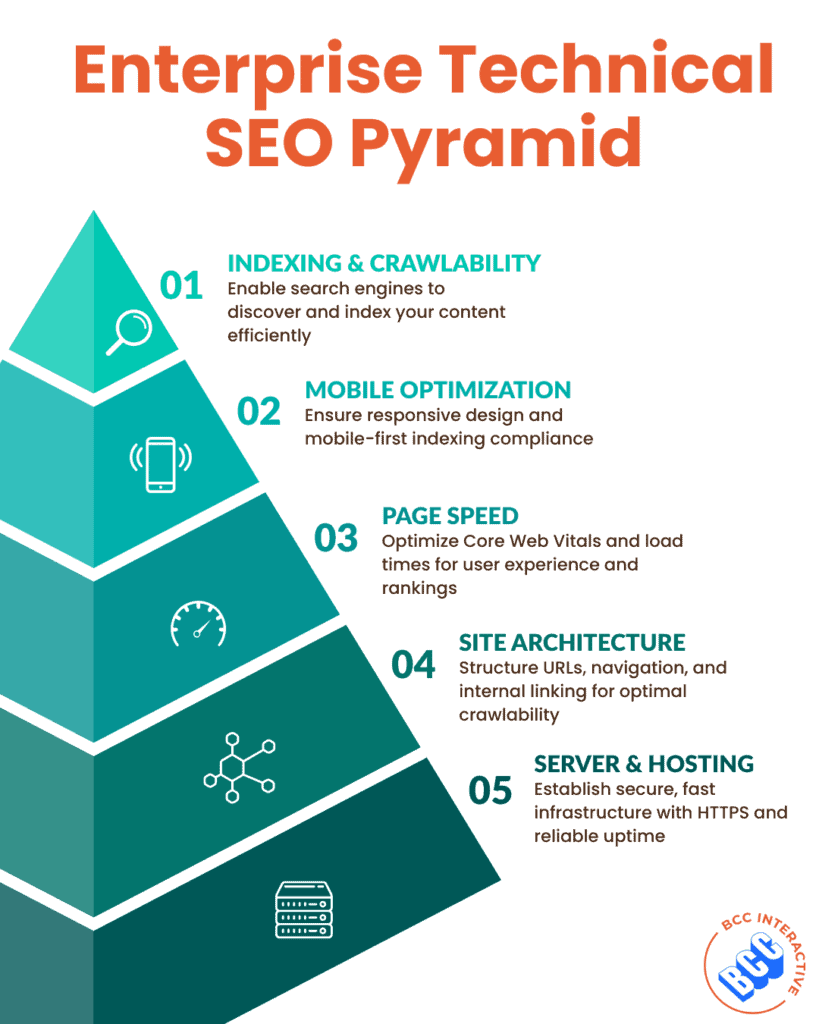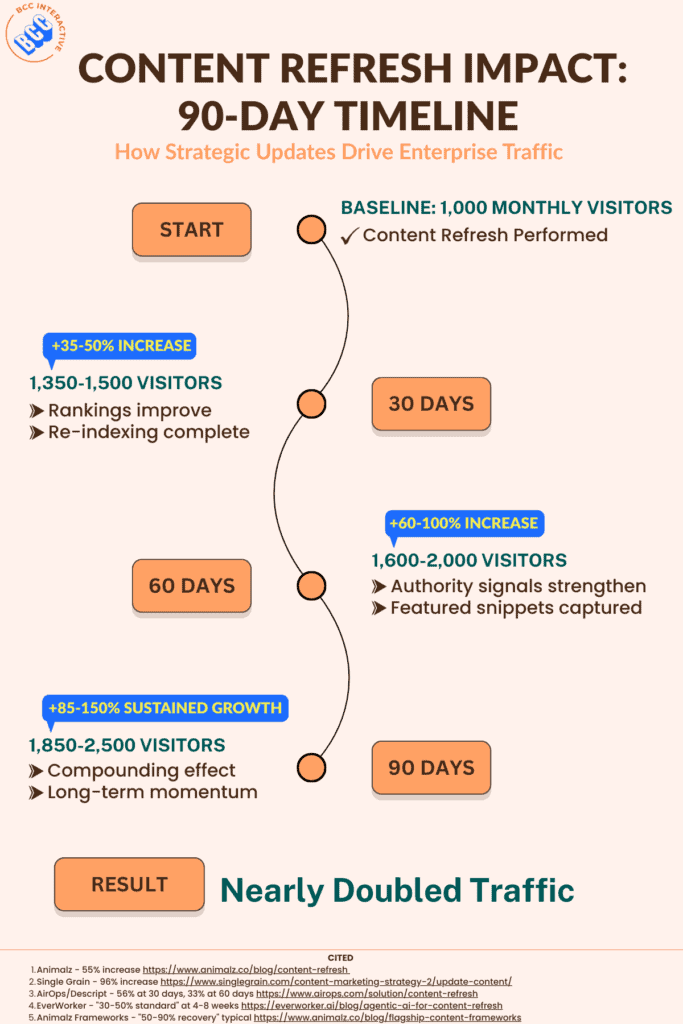Look, as an enterprise or mid-sized corporation, you have numerous products and services that customers are actively searching for. The question isn’t whether there’s demand—it’s whether you’re showing up when it matters. And the most effective long-term strategy to capture that constant demand? SEO. Not the flashy stuff. The stuff that actually works.
Here’s the thing about running a successful enterprise SEO strategy: you need to be focused, agile, and ready to scale. Too many companies get bogged down with low-impact, high-effort SEO tasks that leave them exhausted with nothing to show for it. That’s no way to compete.
That’s exactly why we’re here—to help you focus on what actually moves the needle. Real impact. Real organic traffic growth. Real results for your enterprise website.
What is Enterprise SEO and What Makes it Different?
Let me cut through the jargon for a second. Enterprise SEO refers to a specialized approach to search engine optimization tailored specifically for organizations operating at a large scale. We’re not talking about your typical small business website here. Unlike regular SEO, enterprise search engine optimization is a completely different challenge—thousands of pages, multiple stakeholders who all think they know best, and enough complexity to make your head spin.
The difference between enterprise SEO and traditional SEO? Think of it like comparing a small retail operation to managing a national supply chain. Traditional SEO often works with smaller websites—straightforward structures, quick decisions, fast execution. Enterprise-level SEO? You’re dealing with:
- Thousands (or millions) of pages
- Complex site architectures
- Multiple subdomains and international versions
- Extensive product catalogs
- Cross-departmental coordination
- Greater compliance and governance requirements
PRO TIP
When it comes to digital marketing for an enterprise-level corporation, it’s essential to take a holistic view of the customer journey and identify where your SEO efforts can generate the most significant impact.
Why Enterprise SEO Differs from Traditional SEO
Here’s the reality nobody talks about: successful SEO strategies that crush it for smaller companies usually fall flat at enterprise scale. And there’s one big reason why. Enterprise companies are siloed like crazy. Marketing doesn’t talk to IT. IT doesn’t talk to the product team. The product team doesn’t talk to sales. It’s a coordination nightmare that kills even the best strategies.
Let me give you an example. Say your enterprise SEO team is laser-focused on driving traffic to a specific product or service. Great! But if that goal isn’t woven into the broader marketing strategy—if it’s not aligned with what IT is building, what sales is selling, and what leadership actually cares about—you’re just spinning your wheels. Impressive activity, zero impact.
Your approach has to sync up with your company’s top-level goals, or you won’t get anywhere. In enterprise SEO, coordination is everything.
| Aspect | Regular SEO | Enterprise SEO |
|---|---|---|
| Scale | 100-1,000 pages | 10,000+ pages |
| Team Structure | 1-3 people | Dedicated SEO team across departments |
| Tool Requirements | Basic SEO tool sets | Enterprise SEO platform required |
| Implementation Speed | Days to weeks | Weeks to months |
| Stakeholder Management | Limited | Extensive across multiple teams |
| Technical Complexity | Moderate | High - requires on-page and technical SEO expertise |
| Budget | $500-$5,000/month | $10,000-$100,000+/month |
PRO TIP
The Benefit of Enterprise SEO for Large Organizations

Delivering impact at scale requires a skilled enterprise SEO team using multiple tactics to move the organic search needle. To highlight this fact, enterprise SEO platform Conductor partnered with Ascend2 in a study that found 57% of enterprises said their most challenging obstacles to achieving important SEO objectives were limited SEO in-house skills.
Teaming up with an enterprise SEO company or enterprise SEO provider to elevate the skill set of your in-house team can help your company progress towards achieving its goals without missing a beat.
The best SEO solution can help with:
- Streamlining your brand messaging across all digital touchpoints
- Lowering the cost of paid advertising by improving organic search rankings
- Generating more qualified leads through targeted content strategies
- Increasing audience and brand visibility across search engine results
- Improving customer satisfaction KPIs like Net Promoter Score
- Maximizing ROI on your overall marketing strategy
A successful enterprise SEO strategy ensures that you meet the needs of your target audience at each stage of the customer journey. It can range from developing marketing assets that answer general questions at the top of the funnel to creating landing pages with specific and detailed information about the solutions you offer at the bottom of the funnel.
In the end, the result is trust and familiarity, making your brand a powerful resource for loyal and engaged customers over a lifetime.
Ready to Scale Your SEO Efforts?
Different Elements of Enterprise SEO
Enterprise SEO involves multiple components working together seamlessly. Let’s break down the crucial elements that help enterprise businesses succeed.
Technical SEO for a Strong Foundation
Listen, as an enterprise organization, your website’s technical foundation is non-negotiable. For large-scale sites, technical issues don’t just hurt user experience—they directly impact revenue. Even a one-second delay in page load time can reduce conversions by 7%, according to research from Akamai.
Your enterprise website needs to meet the demands of modern customer behavior AND search engine algorithms. If either one finds your site slow, broken, or confusing, you lose. Simple as that. The goal? Maximum crawlability so search engines index your pages fast and accurately.
Technical SEO best practices for enterprise sites include:
- Proactive planning of website architecture – Structure matters at scale
- Making your site SSL secure using HTTPS protocol
- Using categories or landing pages to organize content logically
- Optimizing each page for speed and mobile responsiveness
- Organizing redirects and 404 pages to prevent crawl waste
- Submitting an optimized XML site map for efficient indexing
- Optimizing HTML and CSS for seamless navigation
- Creating a clear and concise site map for users and search engines
PRO TIP

On-Page SEO to Deliver the Right Message
Here’s what most people miss: as search engine algorithms get smarter, on-page SEO becomes MORE important, not less. Why? Because it creates clarity for both users and search engines. When done right, on-page SEO delivers quality, relevant messaging on your landing pages that actually answers what people are looking for.
No fluff. No keyword stuffing. Just clear, helpful content that serves the user and signals to Google exactly what your page is about.
Use the following to boost your on-page SEO strategy:
- URLs that are the right length and contain relevant keywords
- Title tags and meta descriptions that clearly define the pages
- Accurate structured data to help search engines understand content
- Engaging and descriptive headers that improve readability
- Compelling, easy-to-understand content that serves user intent
- Internal and external linking with regular updates and audit cycles
- Optimized images with proper alt text and compression
- Appropriate, meaningful CTAs that guide users through the funnel
- Regular checks for thin and duplicate content across your enterprise site
Improve Your Visibility with Off-Page SEO
While on-page SEO makes sure you’re saying the right things, off-page SEO determines whether anyone can actually find you in the first place. It’s the difference between having a great product and having a great product that people actually KNOW about.
Off-page SEO happens outside your website—link building, brand mentions, social media shares. These are the signals Google uses to figure out who’s legit and who’s not. Think of links like votes of confidence. When an authoritative site links to yours, they’re basically telling Google, “Yeah, these guys know their stuff.” That credibility adds up fast.
But here’s where enterprise companies need to be smart: at scale, quality beats quantity every single time. One link from the Wall Street Journal is worth more than 100 links from no-name blogs nobody reads.
Best practices for enterprise link building:
Mix manual outreach with high-impact, low-effort SEO strategies. It’s about working smarter. Reach out to publishers, bloggers, and influencers who actually matter in your space. Build real relationships. Keep your emails short and show them exactly what’s in it for their audience—whether that’s a guest post, cross-promotion, or quality content they can use.
Link reclamation is one of those low-hanging fruit opportunities that pays off big. Someone mentions your company in an article, but doesn’t link? Send them a polite email asking for the link. Takes five minutes, costs nothing, and you get all the SEO value you should’ve had in the first place.
Same thing with broken inbound links. Pages get moved, URLs change, and links break. Most publishers will fix it if you just ask. And that fixed link is worth more than a redirect because it goes directly where it should.
PRO TIP
Helpful Tools & Resources for Enterprise SEO
Let’s talk tools. A good SEO strategy depends on scalability, which means you need the right enterprise SEO tools and software. Period. Process management tools, defined workflows, automation—these aren’t nice-to-haves. They’re essential for integrating departments and actually getting stuff done efficiently for your SEO program.
Essential Enterprise SEO Tools
| Tool Category | Recommended Tools | Primary Use |
|---|---|---|
| Enterprise SEO Platforms | BrightEdge, Conductor, SearchMetrics | Comprehensive SEO management at scale |
| Analytics & Reporting | Google Analytics, Adobe Analytics | Traffic analysis and conversion tracking |
| Search Console Data | Google Search Console | Performance monitoring and indexing issues |
| Technical SEO Audits | Screaming Frog, Botify, DeepCrawl | Site health checks and technical SEO issues |
| Keyword Research | SEMRush, Ahrefs, Keyword Explorer | Finding opportunities and tracking rankings |
| Competitor Analysis | SEMRush, Ahrefs, SpyFu | Understanding competitive landscape |
| Content Optimization | Clearscope, MarketMuse, SurferSEO | On-page content optimization |
| Trend Analysis | Google Trends, Answer the Public | Identifying emerging topics and questions |
| Performance Testing | Google PageSpeed Insights, GTmetrix | Speed optimization and Core Web Vitals |
| Structured Data | Google Structured Data Testing Tool | Schema markup validation |
| Link Analysis | Moz, Ahrefs, Majestic | Backlink profile analysis |
| Social Listening | BuzzSumo, Brandwatch | Content ideas and brand mentions |
PRO TIP
When evaluating enterprise SEO platforms like BrightEdge or Conductor, look for these essential features:
- Workflow automation to handle time-consuming SEO tasks
- Cross-departmental collaboration capabilities
- Custom reporting dashboards for different stakeholders
- API integrations with your existing tech stack
- Scalable crawling for large enterprise websites
- AI-powered recommendations for SEO activities
Need help selecting and implementing the right enterprise SEO tools for your organization?
8 Enterprise SEO Strategies to Skyrocket Your Business
1. Adjusting for Consumer Intent with Content Refreshes
Every enterprise business wants to rank for high-volume, high-value keywords. But here’s what’s changed: customer search behavior isn’t what it used to be. Customers ask more detailed, specific questions now than they did 5-10 years ago. Their intent is different. Their language is different. If your content doesn’t reflect that, you’re essentially trying to sell to yesterday’s customers with yesterday’s messaging.
Keyword research isn’t optional—it’s critical for staying relevant. You need to make sure your copy is updated AND accurately meets the specificity customers are using when they search for products and services in 2025.
And here’s a quick win most companies miss: fewer and fewer people land on Page 2 of Google. Over 90% of clicks happen on Page 1. So if you’re ranking positions 11-20—what we call “striking distance”—you’re leaving massive traffic on the table. Identify those keywords. Optimize those pages. Get on Page 1. That’s where real traffic lives.
How to execute content refreshes at enterprise scale:
- Run a comprehensive content audit using your enterprise SEO platform
- Identify pages ranking positions 11-20 for valuable keywords
- Analyze the current top 10 results to understand what Google rewards
- Update content to better match search intent and user needs
- Improve technical SEO elements (speed, mobile-friendliness, Core Web Vitals)
- Add fresh data, statistics, and examples from the current year
- Enhance visual elements with updated graphics and multimedia
- Monitor the metric changes over 30-60 days and iterate
PRO TIP

2. Prioritize the Mobile-First Experience
Google’s already made the switch for most sites—mobile-first indexing is here. And they’ve been crystal clear: eventually, ALL websites will have their mobile version prioritized over desktop. If you’re an enterprise organization that’s still treating mobile as an afterthought, you’re already behind.
For enterprise websites where desktop traditionally got all the love, this is a wake-up call. Responsive design isn’t a nice-to-have anymore. It’s mandatory. Your website needs to work just as well on a phone as it does on a 27-inch monitor. Smaller text sections, more visuals, informative headers, interactive buttons—all optimized for thumbs, not mouse clicks.
The goal? Visitors should be able to interact with everything on their phone without zooming, scrolling sideways, or rotating their screen. If they have to do any of that, you’re losing them.
Mobile-first SEO best practices for enterprise:
- Implement responsive design across all page templates
- Optimize Core Web Vitals (LCP, FID, CLS) specifically for mobile
- Reduce server response times for mobile users
- Compress images without sacrificing quality
- Use lazy loading for below-the-fold content
- Simplify navigation for thumb-friendly interactions
- Test checkout and conversion flows extensively on mobile devices
- Monitor mobile vs. desktop performance separately in Google Analytics
PRO TIP
3. Utilize Featured Snippets to Capitalize on No-Click Searches
Google’s gotten smarter over the years, adding all kinds of interactive features to search results. Knowledge graphs, images, carousels, featured snippets—these SERP features are everywhere now. And they’re critical to your organic search strategies.
Featured snippets let users get answers without ever clicking through to your site. Lists, how-tos, local packs—Google serves it up right there. According to Rand Fishkin’s research, in 2020, about 50% of Google searches ended without a click.
Let that sink in.
This isn’t a problem—it’s an opportunity. Especially with voice search exploding. Google Home, Alexa—they pull their answers straight from featured snippets. If you’re not capturing those snippets, you’re invisible to the fastest-growing search behavior out there.
How to optimize for featured snippets:
| Snippet Type | Content Format | Best Practices |
|---|---|---|
| Paragraph | 40-60 words answering a question | Use the question as H2, answer directly in the following paragraph |
| List | Ordered or unordered list | Use proper HTML list formatting, aim for 5-8 items |
| Table | Structured data in rows/columns | Use HTML table tags, clear headers, and concise data |
| Video | YouTube video with timestamp | Optimize video title/description, use chapters/timestamps |
PRO TIP
4. Regular Site Health Checks and Updates
Here’s a truth most people don’t want to hear: maintaining site health is boring. It’s not sexy. Nobody’s winning awards for fixing 404 errors. However, it’s absolutely vital to any effective SEO strategy, and it’s crucial for enterprise organizations with massive, complex technical environments.
Think of it like maintaining a house. If you ignore the foundation, things don’t collapse all at once. They deteriorate slowly. One crack becomes two. Two becomes four. Before you know it, you’re dealing with structural damage that costs 10x more to fix than if you’d just maintained it properly.
Same with your website. Good site health ensures search engines can crawl and index your pages correctly. And here’s the kicker: superior site health can be THE difference between you and a competitor with the same domain authority and similar content. Regular SEO audits aren’t optional at the enterprise level—they’re survival.
Essential elements of regular SEO audits:
- 404 errors and broken links – Fix or redirect properly
- Crawl errors and indexing issues – Address in Google Search Console
- Duplicate content – Canonicalize or consolidate pages
- Page speed issues – Prioritize by traffic and conversion value
- Mobile usability problems – Test across devices and browsers
- Security issues – Maintain SSL certificates and secure protocols
- Structured data errors – Validate and fix schema markup
- Internal linking opportunities – Connect related content effectively
Recommended audit frequency for enterprise sites:
- Daily: Critical monitoring (site uptime, major crawl errors)
- Weekly: Quick health checks (new 404s, indexing issues)
- Monthly: Moderate technical reviews (page speed, mobile issues)
- Quarterly: Comprehensive audits (full site crawl, content audit)
- Annually: Strategic reviews (site architecture, UX improvements)
Utilize enterprise SEO tools like SEMRush, Moz, Ahrefs, or dedicated platforms like Botify and DeepCrawl to identify and clean up issues systematically.
PRO TIP
5. Leverage Exclusive Data and Visuals
You know what you have that your competitors don’t? Your data. Your insights. Your unique perspective on your industry.
I’m not saying publish your trade secrets or give away the playbook. But a customer survey? Industry benchmarks? An analysis of trends you’re seeing? That’s gold. That’s where SEO and content marketing come together and create something powerful.
Visual assets make all the difference in how people consume and share your data. Infographics aren’t just pretty—they’re strategic. According to Backlinko, infographics generate 25.8% more backlinks than videos or how-to articles. When it comes to enterprise SEO strategies, data-driven content is one of the smartest plays you can make.
Types of data content that attract links:
- Industry benchmark reports
- Original research studies and surveys
- Year-over-year trend analysis
- Interactive calculators and tools
- Market analysis and forecasts
- Case studies with real results
- Comprehensive state-of-the-industry reports
PRO TIP
6. Eliminate Pages That Have No Value
Let’s be real: enterprise sites can be absolute beasts. Thousands of pages, multiple subdomains, legacy content nobody even remembers creating. It’s a mess. And keeping it organized isn’t just a headache—it’s a strategic necessity.
Quarterly content audits help you identify and cut the dead weight. Pages that are too similar. Content that’s no longer relevant. Stuff that’s just outdated and dragging you down. The benefit of enterprise SEO is knowing when to prune.
HubSpot deleted 3,000 pieces of outdated content and saw traffic increase. Not decrease—INCREASE. That should tell you something. Sometimes, addition by subtraction is the smartest move you can make.
A simple way to start is with pages that feature products that you no longer sell or marketing campaigns that have been completed, as they are great opportunities for cleanup.
What to do with low-value pages:
| Page Type | Action | Rationale |
|---|---|---|
| Outdated products | 301 redirect to the current alternative | Preserve link equity, guide users |
| Thin content (<300 words) | Expand or consolidate | Improve content depth and relevance |
| Duplicate pages | Canonicalize or merge | Prevent keyword cannibalization |
| Orphaned pages | Add internal links or prune | Improve crawlability and discoverability |
| Zero-traffic pages (12+ months) | Evaluate for deletion | Free up crawl budget |
| Seasonal campaigns (expired) | Archive or redirect | Maintain a clean site structure |
PRO TIP
7. Positive Brand Mentions for Increased Prominence
Brand mentions don’t get talked about as much as link building, but they’re almost as powerful for enterprise-level SEO. Why? Because Google cares about prominence. Having your company mentioned positively across the web—social media, customer reviews, news articles—tells Google you’re legitimate. You’re trusted. You matter.
Traditional SEO often misses this completely. It focuses on technical optimization and links, while ignoring the brand-building signals that search engines increasingly use to determine who deserves to rank.
How to monitor and leverage brand mentions:
- Use Google Alerts for real-time notification of brand mentions
- Use enterprise SEO tools like SEMRush or BuzzSumo for comprehensive monitoring
- Track positive, negative, and neutral sentiment across mentions
- Reach out to publishers who mention you without linking (link reclamation)
- Engage with positive mentions on social media to amplify reach
- Address negative mentions promptly and professionally
- Create a brand mentions report for stakeholders
PRO TIP
8. Run Internal Linking Audits with Regularity
Internal links rarely make the top of anyone’s SEO priority list. But their impact—especially on larger sites—is massive. This is one critical component of an effective SEO strategy that even smart enterprise SEO teams typically overlook.
Most enterprise businesses nail the basics. Service pages linked from navigation? Check. Core features connected? Got it. But then they completely drop the ball on internal linking from their blog and content hub. That’s where the real opportunity is.
Internal link optimization helps search engines find your less-visible content. More importantly, it connects contextually relevant pages, strengthening your site’s overall topical authority and SEO performance. Do this right, and you’re not just helping Google—you’re guiding users to exactly what they need.
Internal linking best practices for enterprise sites:
- Create topical clusters – Link related content together around pillar pages
- Use descriptive anchor text – Avoid generic “click here” or “learn more”
- Link to conversion pages – Guide users toward business outcomes
- Balance link distribution – Don’t concentrate all links on the homepage
- Update old content – Add links to newer relevant content
- Monitor orphan pages – Ensure every page is linked from somewhere
- Set maximum crawl depth – Important pages should be <3 clicks from homepage
- Avoid excessive internal links – Keep to <100 per page for best results
Internal linking audit checklist:
- Identify orphan pages with zero internal links
- Find pages with excessive internal links (>100)
- Locate broken internal links and fix them
- Map topical clusters and verify connections
- Analyze internal link anchor text distribution
- Review homepage and navigation link strategy
- Assess internal linking from the blog to the conversion pages
- Document internal linking guidelines for the content team
PRO TIP
How Your Enterprise Business Should Proceed Executing Enterprise SEO Strategies
Look, I’ll be straight with you: SEO and content marketing are the most effective long-term marketing channels for driving organic traffic to your website. Improving the quality and content of your enterprise website gives visitors the answers they’re searching for and converts them into qualified leads.
As an enterprise-level business, you’ve got options. Build an in-house SEO team, partner with the right SEO company or enterprise SEO provider, or do some combination of both.
In-House vs. Agency: Making the Right Choice
| Factor | In-House SEO Team | Enterprise SEO Agency |
|---|---|---|
| Cost | $200K-500K+ annually (salaries + tools) | $10K-100K+ monthly (comprehensive service) |
| Expertise Breadth | Limited to the team's specialties | Access to specialists across all SEO disciplines |
| Scalability | Fixed capacity, slow to scale | Flexible resources, rapid scaling |
| Tool Access | Must purchase/maintain separately | Enterprise SEO platform included in the service |
| Speed to Value | Slower due to the learning curve | Faster due to existing processes |
| Company Knowledge | Deep institutional knowledge | Must learn your business |
| Best For | Large companies with a mature SEO program | Companies building or scaling SEO initiatives |
If you have an in-house SEO team with the right skills and bandwidth, you can probably handle strategy and execution yourself. But here’s what successful enterprise SEO programs do: they supplement internal teams with specialized agency support for specific SEO initiatives or to fill skill gaps. Nobody’s good at everything.
If you’re stretched thin on resources, partnering with an enterprise SEO service provider gives you an entire team of experts for less than the cost of one senior employee. You save money. You save the months it takes to hire and train someone. And you tap into people who’ve already done this successfully for other companies.
What to Look For in an Enterprise SEO Provider
When evaluating an enterprise SEO company, consider these critical factors:
✓ Proven experience with enterprise organizations – Ask for case studies and references from similar-sized companies in your industry
✓ Technical SEO expertise – Enterprise SEO requires deep technical knowledge to handle complex site architectures
✓ Process and workflow capabilities – They should have systems to manage the complexity of enterprise SEO
✓ Cross-functional collaboration skills – They must work effectively with your IT, content, design, and marketing teams
✓ Custom reporting and analytics – Standard reports won’t cut it; you need customized metric tracking aligned with your business goals
✓ Scalable solutions – Their approach should grow with your business, not require constant overhauls
✓ Transparency and communication – Regular updates, clear explanations, and accessible account teams
✓ Enterprise SEO platform proficiency – Experience with tools like BrightEdge, Conductor, or other enterprise-level platforms
PRO TIP
Enterprise SEO Success Starts Here
Enterprise SEO is a specialized approach that demands strategic thinking, technical expertise, and consistent execution across departments. Whether you’re launching your SEO program or scaling your SEO efforts, the strategies here give you a clear roadmap for SEO success at enterprise scale.
Here’s what you need to remember: enterprise SEO typically takes time because of the sheer scale and complexity. That’s reality. But when you execute correctly, SEO drives sustainable growth, slashes customer acquisition costs, and builds a competitive advantage that compounds over the years.
The companies that win? They don’t look for shortcuts. They commit to the process and stay consistent.
Ready to transform your enterprise SEO performance?
At BCC Interactive, we’ve led enterprise-level SEO strategies for Fortune 500 companies. We know what works at scale because we’ve done it. Multiple times. For household names you’d recognize.
We don’t just offer SEO services—we partner with you to build sustainable growth. Data-driven approaches. Qualified leads throughout the customer journey. Results you can measure.
Our comprehensive enterprise SEO solution includes:
- Technical SEO audits and implementation that actually fixes problems
- Content strategy development and execution that drives traffic
- Enterprise SEO platform implementation and management
- Cross-departmental workflow integration that eliminates silos
- Custom analytics and reporting that stakeholders understand
- Ongoing optimization and consistent SEO strategies that compound
We get it: enterprise SEO and traditional SEO aren’t the same challenge. That’s why we’ve developed specialized processes and frameworks built specifically for enterprise environments. We speak your language. We understand your constraints. We know how to navigate the politics and the complexity.
When you partner with us, you get the guidance and expertise to stay ahead of the competition and achieve measurable SEO results that impact your bottom line. Not vanity metrics. Real revenue.
Schedule a FREE consultation with our enterprise SEO team today. Let’s discuss how we can scale your organic search performance and turn your website into the lead-generation machine it should be.
Frequently Asked Questions About Enterprise SEO
Enterprise SEO is a specialized approach designed for large-scale organizations with complex websites, multiple stakeholders, and thousands (or millions) of pages. Regular SEO focuses on smaller sites with simpler structures and fewer coordination requirements.
Enterprise SEO typically ranges from $10,000 to $100,000+ monthly, depending on site size, complexity, competitive landscape, and scope of services. Many enterprise companies invest 5-15% of their digital marketing budget in SEO.
At minimum, you need an enterprise SEO platform (like BrightEdge, Conductor, or SearchMetrics), analytics tools (Google Analytics, Search Console), technical SEO tools (Screaming Frog, Botify), and various tools for keyword research, link analysis, and content optimization.
Enterprise SEO requires patience. While some quick wins (technical fixes, content refreshes) can show results in 30-60 days, comprehensive enterprise SEO strategies typically take 6-12 months to show significant results, with ongoing improvements continuing over the years.
It depends on your resources and maturity. Successful enterprise SEO often combines in-house strategic oversight with agency support for specialized execution. The best approach aligns with your budget, timeline, and internal capabilities.
While organic traffic is important, the best metric depends on your business goals. Focus on metrics that tie to revenue: qualified organic leads, conversion rate from organic search, revenue from organic traffic, and customer acquisition cost from SEO compared to other channels.


